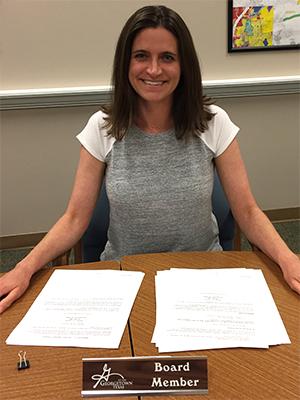In 1992, the Georgetown, Texas, City Council passed a resolution establishing a policy to ensure the non-discrimination of individuals with disabilities in accordance with the American with Disabilities Act (ADA). In 2011, the City Council appointed an ADA coordinator and established an advisory task force to develop a plan to bring the city into compliance. Now every month members of the Georgetown American Disabilities Accessibility Advisory Board listen to residents who have concerns about the city’s efforts to provide a safer environment.
The nine-member board is made up of people with a variety of experiences, from a social worker to a member of the clergy to retired people with disabilities. And one student nurse.

Alexandra Curra-Spurger, a student in the UT Austin School of Nursing, was recently appointed to serve a two-year term during which she hopes both to gain and share knowledge.
“Because of the ADA, every city in the United States must submit an annual report to the U.S. Department of Transportation describing what the city is doing to enhance accessibility for individuals with disabilities,” said Alex, a nurse in the emergency room at St. David’s Hospital in Round Rock, Texas. “It’s become a big deal in Georgetown since the city recently established a public bus system and needs to ensure that all residents can use it. It will be up to the board to make recommendations for the mayor and city council to consider.”
Recent studies describe the positive impact that civic engagement has on nursing students, such as building confidence, and social skills. Students become better equipped to recognize the causes of and develop innovative solutions to complex social problems while they develop critical workplace skills and practice advocacy. Civic engagement can also help students appreciate the requirements of those with diverse needs and minimize unintended harm to disadvantaged and vulnerable residents.
Karen Johnson, associate professor at the UT Austin School of Nursing, agrees. “As an instructor in public health, I try to acquaint my students with the barriers that many individuals face, whether it’s gaining access to health care or public transportation,” she said. “As part of the board, Alex will have the opportunity to advocate for people with disabilities. Nursing knowledge can be extremely beneficial in the public arena, and I think Alex’s appointment to the board is a great example of the value nurse leadership brings to the conversation.”
“Georgetown is a small town that is growing rapidly, and it’s interesting to see how they’re working on these accessibility issues,” Alex said. “We need to make sure that every resident can enjoy what the city has to offer. To get to that place, it’s important that people with disabilities come to the meetings and express their concerns.”
Once she graduates with her master’s degree, Alex plans to move her practice to Georgetown.“I live in Georgetown and want to serve my local community,” she said. “As a member of the board, I’m finding out ways I can do that even better.”